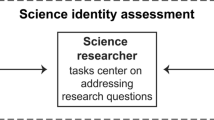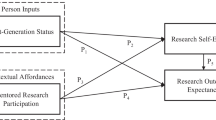Abstract
The current study used self-determination theory to examine the efficacy of an established and rigorous STEM enrichment program, the Summer Science Program, in promoting high school students’ motivation for, and identification with, scientific research. Results of latent change analyses indicated that students’ scientific research identity, intrinsic research motivation, and psychological needs for autonomy, competence, and relatedness increased significantly across two timepoints. Results of hierarchical regression analyses also indicated that satisfaction of autonomy and competence needs at a prior time point was positively associated with later intrinsic research motivation These analyses also suggested that intrinsic research motivation was both a distal and proximal predictor of scientific research identity. Overall, our findings suggest that engaging in authentic research as a high school student has the ability to promote motivation and retention in STEM and plays an important role in facilitating the socialization and assimilation of students into the broader scientific community.



Similar content being viewed by others
References
Baumeister, R., & Leary, M. R. (1995). The need to belong: Desire for interpersonal attachments as a fundamental human motivation. Psychological Bulletin, 117, 497–529. https://doi.org/10.1037/0033-2909.117.3.497.
Black, A. E., & Deci, E. L. (2000). The effects of instructors’ autonomy support and students’ autonomous motivation on learning organic chemistry: A self-determination theory perspective. Science Education, 84, 740–756. https://doi.org/10.1002/1098-237X(200011)84:6<740::AID-SCE4>3.0.CO;2-3.
Browne, M. W., & Cudeck, R. (1993). Alternative ways of assessing model fit. In K. A. Bollen & J. S. Long (Eds.), Testing structural equation models (pp. 136–162). Newbury Park, CA: Sage.
Brownell, S. E., Kloser, M. J., Fukami, T., & Shavelson, R. (2012). Undergraduate biology lab courses: Comparing the impact of traditionally based “cookbook” and authentic research-based courses on student lab experiences. Journal of College Science Teaching, 41, 36–45.
Carlone, H. B., & Johnson, A. (2007). Understanding the science experiences of successful women of color: Science identity as an analytic lens. Journal of Research in Science Teaching, 44, 1187–1218. https://doi.org/10.1002/tea.20237.
Chemers, M. M., Zurbriggen, E. L., Syed, M., Goza, B. K., & Bearman, S. (2011). The role of efficacy and identity in science career commitment among underrepresented minority students. Journal of Social Issues, 67, 469–491. https://doi.org/10.1111/j.1540-4560.2011.01710.x.
Deci, E. L., & Ryan, R. M. (1985). Intrinsic motivation and self-determination in human behavior. New York: Plenum Press.
Deci, E. L., & Ryan, R. M. (2000). The “what” and “why” of goal pursuits: Human needs and the self-determination of behavior. Psychological Inquiry, 11, 227–268. https://doi.org/10.1207/S15327965PLI1104_01.
Deci, E. L., Ryan, R. M., Gagné, M., Leone, D. R., Usunov, J., & Kornazheva, B. P. (2001). Need satisfaction, motivation, and well-being in the work organizations of a former eastern bloc country: A cross-cultural study of self-determination. Personality and Social Psychology Bulletin, 27, 930–942. https://doi.org/10.1177/0146167201278002.
Deemer, E. D., Martens, M. P., & Buboltz, W. C. (2010). Toward a tripartite model of research motivation: Development and initial validation of the Research Motivation Scale. Journal of Career Assessment, 18(3), 292–309. https://doi.org/10.1177/1069072710364794.
Estrada, M., Woodcock, A., Hernandez, P. R., & Schultz, P. W. (2011). Toward a model of social influence that explains minority student integration in the scientific community. Journal of Educational Psychology, 103, 206–222. https://doi.org/10.1037/a0020743.
Hogg, M. A., & Abrams, D. (1988). Social identifications: A social psychology of intergroup relations and group processes. London: Routledge.
Hu, L., & Bentler, P. M. (1999). Cutoff criteria for fit indexes in covariance structure analysis: Conventional criteria versus new alternatives. Structural Equation Modeling, 6, 1–55. https://doi.org/10.1080/10705519909540118.
IBM Corporation. (2017). IBM SPSS Statistics for Windows, Version 25.0. Armonk, NY: IBM Corporation.
La Guardia, J. G. (2009). Developing who I am: A self-determination theory approach to the establishment of healthy identities. Educational Psychologist, 44, 90–104. https://doi.org/10.1080/00461520902832350.
Lave, J., & Wenger, E. (1991). Situated learning: Legitimate peripheral participation. Cambridge, UK: Cambridge University Press.
Lavigne, G. L., Vallerand, R. J., & Miquelon, P. (2007). A motivational model of persistence in science education: A self-determination theory approach. European Journal of Psychology of Education, 22, 351–369. https://doi.org/10.1007/BF03173432.
Lee, J. T. (1998). Which kids can ‘become’ scientists? Effects of gender, self-concepts, and perceptions of scientists. Social Psychology Quarterly, 61, 199–219.
McArdle, J. J. (2009). Latent variable modeling of differences and changes with longitudinal data. Annual Review of Psychology, 60, 577–605. https://doi.org/10.1146/annurev.psych.60.110707.163612.
Merolla, D. M., & Serpe, R. T. (2013). STEM enrichment programs and graduate school matriculation: The role of science identity salience. Social Psychology of Education, 16, 575–597. https://doi.org/10.1007/s11218-013-9233-7.
Merolla, D. M., Serpe, R. T., Stryker, S., & Schulz, P. W. (2012). Structural precursors to identity processes: The role of proximate social structures. Social Psychology Quarterly, 75, 149–172.
Muthén, L. K., & Muthén, B. O. (1998-2016). Mplus user’s guide (7th ed.). Los Angeles, CA: Muthén & Muthén.
National Academies of Sciences, Engineering, and Medicine. (2017). Undergraduate research experiences for STEM students: Successes, challenges, and opportunities (p. 10.17226/24622). Washington, DC: The National Academies Press.
Rodenbusch, S. E., Hernandez, P. R., Simmons, S. L., & Dolan, E. L. (2016). Early engagement in course-based research increases graduation rates and completion of science, engineering, and mathematics degrees. CBE–Life Sciences Education, 15, 1–10. https://doi.org/10.1187/cbe.16-03-0117.
Ryan, R. M., & Deci, E. L. (2000). Intrinsic and extrinsic motivations: Classic definitions and new directions. Contemporary Educational Psychology, 25, 54–67. https://doi.org/10.1006/ceps.1999.1020.
Scogin, S. C., & Stuessy, C. L. (2015). Encouraging greater student inquiry engagement in science through motivational support through by online scientist-mentors. Science Education, 99, 312–349. https://doi.org/10.1002/sce.21145.
Skinner, E., Saxton, E., Currie, C., & Shusterman, G. (2017). A motivational account of the undergraduate experience in science: Brief measures of students’ self-system appraisals, engagement in coursework, and identity as a scientist. International Journal of Science Education, 39, 2433–2459. https://doi.org/10.1080/09500693.2017.1387946.
Spell, R. M., Guinan, J. A., Miller, K. R., & Beck, C. W. (2014). Redefining authentic research experiences in introductory biology laboratories and barriers to their implementation. CBE—Life Sciences Education, 13, 102–110. https://doi.org/10.1187/cbe.13-08-0169.
Sublett, C., & Gottfried, M. A. (2017). Individual and institutional factors of applied STEM course taking in high school. Teachers College Record, 119, 1–38.
Turner, J. C. (1982). Towards a cognitive redefinition of the social group. In H. Tajfel (Ed.), Social identity and intergroup relations (pp. 15–40). New York: Cambridge University Press.
Tyson, W., Lee, R., Borman, K. M., & Hanson, M. A. (2007). Science, technology, engineering, and mathematics (STEM) pathways: High school science and math coursework and postsecondary degree attainment. Journal of Education for Students Placed at Risk, 12, 243–270. https://doi.org/10.1080/10824660701601266.
Wenger, E. (1998). Communities of practice: Learning, meaning, and identity. New York: Cambridge University Press.
White, R. W. (1959). Motivation reconsidered: The concept of competence. Psychological Review, 66, 297–333. https://doi.org/10.1037/h0040934.
Author information
Authors and Affiliations
Corresponding author
Additional information
Publisher’s Note
Springer Nature remains neutral with regard to jurisdictional claims in published maps and institutional affiliations.
Rights and permissions
About this article
Cite this article
Deemer, E.D., Ogas, J.P., Barr, A.C. et al. Scientific Research Identity Development Need Not Wait Until College: Examining the Motivational Impact of a Pre-college Authentic Research Experience. Res Sci Educ 52, 1481–1496 (2022). https://doi.org/10.1007/s11165-021-09994-6
Accepted:
Published:
Issue Date:
DOI: https://doi.org/10.1007/s11165-021-09994-6




